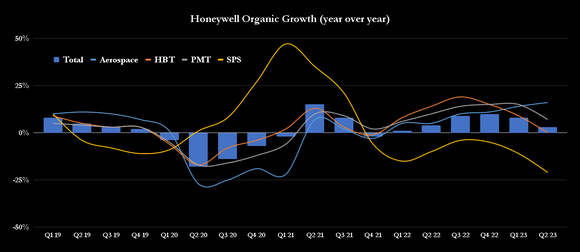Sometimes, it's easy to fall into the trap of thinking that the stock market is a voting machine for an election company's progress. While that's true somewhat, it doesn't tell the whole picture. Valuations also matter; sometimes, they get ahead of matters, causing stock prices to correct despite relatively good news from companies. That's what happened recently with Honeywell (HON +0.41%), Rockwell Automation (ROK 0.14%), and Apple (AAPL +0.34%). There wasn't a lot wrong with their recent earnings report, but all three stocks are down over the last month. Here's why.
1. Honeywell International

NASDAQ: HON
Key Data Points
Honeywell's stock is down over the last month, along with the other two companies featured. That might seem odd because Honeywell raised the midpoint of its full-year sales and earnings guidance on account of raising the low end of their ranges. Moreover, it marked the continuance of raising full-year guidance on every possible earnings call since the start of 2021.
Moreover, the industrial conglomerate performed precisely as you might expect one to do, with strength in aerospace and performance materials & technologies (PMT) offsetting a slowing in Honeywell Building Technologies (HBT) and safety and productivity solutions (SPS).
For reference, management nudged its full-year sales expectations for PMT upward (backed by strong demand for processing and refining shipments and process solutions) and nudged its SPS guidance lower (e-commerce fulfillment warehouse spending remains on pause).
It's typical behavior for a conglomerate, as they rarely fire on all cylinders simultaneously, and as noted above, Honeywell raised its full-year guidance.

Data source: Honeywell presentations.
That said, alongside Apple and Rockwell, it's hard to argue that Honeywell is an outstanding value stock. Enterprise value (EV, market cap plus net debt) to earnings before interest, taxation, depreciation, and amortization (EBITDA) is a common valuation. While valuations are always subject to a company's circumstances (and I'll discuss other valuations later), a valuation of around 12 is often considered decent value for an industrial conglomerate. As you can see below, it's likely to be a while before Honeywell gets there unless the price drops.
HON EV to EBITDA (Forward) data by YCharts.
2. Rockwell Automation

NYSE: ROK
Key Data Points
The automation company's third-quarter earnings report saw the company narrow its full-year guidance ranges and pretty much keep its earnings expectations in line with the midpoint of prior guidance.
If there was a negative around its results and guidance, it came from management downgrading its expectation for full-year orders and backlog. CEO Blake Moret now expects full-year orders of $8.5 billion to $9 billion and a backlog of $4.5 billion to $5 billion; this compares with previous guidance of $9 billion in orders and $5 billion in backlog.
The downgrade is in response to a moderation in orders due to Rockwell reducing the lead times (the time between an order and delivery of a product) as the supply chain eases. Consequently, customers are "no longer placing unusually large advanced orders," according to Moret.
However, according to Moret on the earnings call, this will likely prove a temporary slowing as machine builders adjust inventory levels. At the same time, "we've also had direct conversations with our distributors, and in North America, some of our largest distributors are actually seeing year-over-year order increases."
As such, don't be surprised if Rockwell's orders pick up again in its fiscal 2024, as management expects it to. Turning to valuation matters again, based on the price-to-earnings multiple, Rockwell is still not a cheap stock.
HON PE Ratio (Forward 1y) data by YCharts.
3. Apple

NASDAQ: AAPL
Key Data Points
It's no secret that consumer electronics spending has been under pressure this year. It comes down to a combination of higher interest rates slowing consumer discretionary spending and a natural slowing following the boom years when the lockdowns encouraged spending on consumer electronics.
As such, Apple's recent third-quarter results saw the company report a 4.4% year-over-year decline in product sales, with notable weakness in Mac and iPad sales, down 7.3% and 19.8%. Still, the iPhone makes up slightly more than 65% of product revenue, and it grew on a constant-currency basis (down 2.4% on a reported basis).
Moreover, Apple grew its higher-margin services revenue by 8.2% in the quarter. For reference, Apple's services revenue came with a 70.5% gross margin in the quarter compared to just 35.4% for products.
Furthermore, Apple's paid subscriptions passed more than one billion in the quarter -- almost double the figure of three years ago.
Apple is growing its services revenue and competing well with its iPhone in challenging market conditions. When its end markets improve, the company will likely emerge as a higher-margin and more cash-generating one.
HON Price to Free Cash Flow data by YCharts.
However, as shown in the price-to-free-cash-flow chart above, Apple's valuation is no longer cheap following a strong run in 2023.
All three are attractive companies performing well in their operations despite the stock price sell-off. They are good stocks to monitor and pick up if they worsen from here. Valuations matter, but so does investing in high-quality companies, and all three fit that description.



